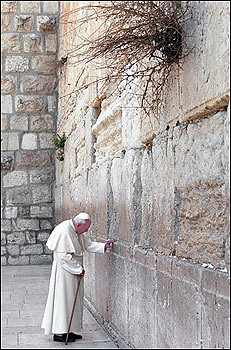Where was God?
Ultimately, any attempt to answer this question will lead to futility. Any answer is bound to raise new questions, each leaving more confusion in its wake. The most challenging questions in the theological realm focus on the existence of evil in this world. Isaiah speaks of it almost matter-of-factly when he says: "I form light and create darkness, I make Shalom and create evil - I, God, do all these things." (45:7) But this verse seems so harsh that when the sages coined the first of the morning blessings preceding the Shema using the same verse, they made one change: Praised be You... who forms light and creates darkness, makes Shalom and creates everything. Everything - to include suffering, catastrophe, evil. It is part of the order of the universe; we may question why, but the answers are beyond our comprehension, because we cannot peer into the mind of God any more than we can through our interpretation of the words of Tanakh, the Hebrew Bible, the expression of the Divine Will. We are told that there are "70 facets to Torah," that the same verse may yield diverse and disparate interpretations, and when it comes to our understanding of God, it is no less the case.
In the days following the tsunami, I turned to the many articles by religious leaders that were posted on the Internet. One interesting explanation came from Sir Jonathan Sacks, Chief Rabbi of Great Britain. Rabbi Sacks turned to Maimonides to explain that
Natural disasters... have no explanation other than that God, by placing us in a physical world, set life within the parameters of the physical. Planets are formed, tectonic plates shift, earthquakes occur, and sometimes innocent people die. To wish it were otherwise is in essence to wish that we were not physical beings at all. Then we would not know pleasure, desire, achievement, freedom, virtue, creativity, vulnerability and love. We would be angels - God's computers, programmed to sing His praise.
God may set the dynamics of nature in motion, but from there it would seem to function on its own, much like the watch once it leaves the hands of the watchmaker.
Rabbi Sacks, in his attempt to come to grips with the tsunami, says that our response to such disasters is not to seek understanding, but to attempt to become a partner in creation by bringing "comfort to the bereaved, [to] send healing to the injured and aid to those who have lost their livelihoods and homes."
But Maimonides also rejects the idea that natural calamity is meaningless and without reason. We cannot blame God for the way in which nature takes its toll on innocent victims, but we are also forced to understand what problems underlie the catastrophe.
Indeed, Rabbi Sacks' solution, to partner with God in the works of recovery is something that we have become good at doing. We all join in opening our pockets and lending a hand, in feeling a sense of solidarity with those who have suffered from disasters like Hurricane Katrina.
But what happens between the disasters? For millions of people, the levees that shield them from despair are very weak. Every day leads to new breaches that leave individuals and families foundering in the deluge, some who drown in the torrents with no one there to offer a lifeline. We overlook those disasters on a daily basis; we are only led to outrage when cataclysm strikes en masse. While Boston prepared to take in Katrina's refugees, it led an assault on its' homeless, taking what few belongings that they had to make their homes under overpasses. While Massachusetts worked to welcome those who lost everything to nature's fury, it forgot its own residents who lack access to health care and basic necessities of life.
Between the disasters, do we think about how our actions can further the damage done by these acts of nature? We may not be able to prevent natural disasters of this magnitude, but we can mitigate their impact by not developing wetlands; we may be able to minimize the number of losses by making it possible for people with lesser means to have the wherewithal to escape nature's wrath when it comes their way. We can prevent greater damage to life and property by making sure that needed resources are not misappropriated, by making sure that the funds needed to shore up the levies are not cut and that the personnel for emergency management and public safety are appropriate and available.
Disasters happen; they are a part of nature that God created. We cannot prevent these disasters from occurring. But we do play a part as custodians of that creation, and we sometimes have the power to mitigate the impact of these powerful events. Before we ask, "Where was God?" perhaps the appropriate question to be asked is "Where were we?"
